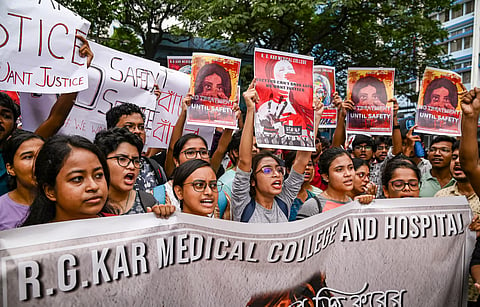Interview | Kolkata doctor rape and murder: ‘Horrific incident underscores need for protection Act’
NEW DELHI: For the last two days, the doctors are out in the street demonstrating their anger against the ghastly rape and murder of their female counterpart in Kolkata.
The protest, which began at a local level in West Bengal, spreads to other parts of the country with hundreds of doctors striking work. They are demanding time-bound probe in the case and adequate security for medicos in hospitals, among others. The initial call for a nationwide strike by the Federation of Resident doctors Association (FORDA) was followed by the Federation of All India Medical Association (FAIMA). In Delhi alone, almost every government medical college and hospital are facing indefinite shutdown of its elective services. The Indian Medical Association (IMA) on Tuesday held a meeting with Union Health Minister J P Nadda to raise key issues affecting the medical community and gave him a memorandum of demands, which included declaration of hospitals as safe zones, introduction of a central law against violence, and security stipulations for medical college recognition.
In an interview with Dr Aviral Mathur, president, FORDA, and Dr Rohan Krishnan, chairman, FAIMA, Ashish Srivastava tries to find out doctors’ plights, strike’s relevance on national pedestal and the repercussions being faced by the patients.
Although the incident occurred in Kolkata, why has your association called for a nationwide strike?
Aviral: This is not just a crime against healthcare workers; it’s a crime against humanity itself. What happened is a horrific act and is unacceptable. As a resident doctors’ organisation, we believe that our colleague’s suffering demands strong condemnation and solidarity of all doctors across the country. More importantly, this is a matter of human dignity, and we feel that the issue should not be protested by doctors alone. It is crucial that the general public and people from all walks of life join us in this movement, and we are seeing increasing support as awareness grows.
Rohan: The impact of such a dreadful tragedy cannot be confined to a specific region. For instance, a female doctor in Andaman and Nicobar now fears performing night duties due to this incident. Additionally, the initial investigation was deeply troubling, as authorities attempted to misclassify the brutal rape and murder as a suicide. There are suspicions that the autopsy report may have been tampered with. This reflects a systemic failure, and as a medical community, we must stand united and speak out against this atrocity committed against one of our own.
What is the primary objective of the strike, and how does it aim to address the concerns of medical professionals and patients alike?
Aviral: We urged the protesting students in Bengal to have their demands addressed promptly. They seek justice for the accused, enhanced security at their institution, compensation, and a CBI inquiry, which has now been initiated. With these demands being partially met, it’s crucial that we ensure such incidents do not set a dangerous precedent. We believe it’s time to ratify the Center Healthcare Protection Act. At the very least, the Health Ministry should form a committee to address these issues, including representatives from the resident doctors who are on the front lines.
Rohan: The strike’s primary goal is to secure justice for the RG Kar Medical College student and her family. We have called for a CBI investigation, compensation for her parents, and the suspension of the principal. Although the principal resigned, he was quickly reassigned to another medical college, eroding our trust in the system. We continue to advocate for a Central Protection Act to safeguard doctors working in vulnerable conditions.
Why is a strike deemed necessary to demand the enforcement of the CPA, and how do FORDA and its members justify the potential inconvenience to patients in light of their demands for greater safety and security in the workplace?
Aviral: We believe that a doctor who feels safe, secure, and unburdened by the fear of injury or aggression in the workplace is in a much better position to contribute positively to society. When doctors can perform their duties without the looming threat of litigation or violence, they become valuable assets to their patients and the community. Implementing the Act not only benefits doctors but also serves patients in the long run. Any act of aggression against doctors ultimately hampers patient treatment. We acknowledge that patients are currently affected by the strike, and to mitigate this, we have continued providing emergency services and supporting our colleagues in those critical areas.
Rohan: The strike is crucial to push for the enactment of the CPA. During the COVID-19 pandemic, the government swiftly enacted similar protections for doctors under pressure. We have been advocating for the CPA in Parliament for the past 3-4 years, yet assaults and harassment against doctors persist. We cannot stand idly by while our colleagues face such attacks; it’s time to take decisive action.

